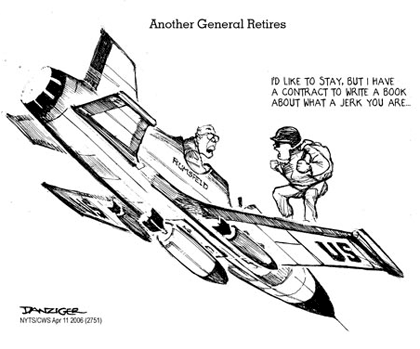Back in October, I wrote a Vermont Public Radio commentary about a story that died way too quickly: the pharmaceutical lobby (PHRMA) actually commissioned a novelist to write a thriller in which terrorists use cheap imported Canadian drugs to poison unwitting Americans.
According to the New York Daily News, PHRMA offered ghost-writer Julie Chrystyn six-figures to write the book to their specifications. That sounds like a ton of money, but you need to keep in mind that importation of cheaper drugs from Canada costs Big Pharmaceutical about $1 billion in annual profits.
Not surprisingly, there were some problems with the deal. PHRMA didn’t like Julie Chrystyn’s first draft. According to her eventual coauthor, the drug lobby “wanted it somewhat dumbed down for women, with a lot more fluff in it.”
Not a problem: they brought in a relief novelist, who successfully dumbed it down and fluffed it up.
The real glitch was that the media got hold of the story. Almost instantly, PHRMA offered Chrystyn 100,000$ to kill the project and keep it quiet.
Needless to say, it didn’t stay quiet: my piece was one of about nine thousand that picked up on it. I went for flat-out satire.
“I don’t know about you,” I wrote, “but I for one am livid about this: Who, may I ask, is this Julie Chrystyn, and how and why did she get the nod to write the fake drug novel?
“I don’t want to brag, but I like to think that in the fiction world, I’m fairly well-known for second-rate plot and a certain laxness of ethical standards. I’m not saying the drug kingpins should have come to me immediately, but what about a chance to underbid and/or demonstrate a lower level of integrity than ‘veteran ghost writer’ Julie Chrystyn?
“Believe me, if the job had come my way, no one would have had to ‘dumb it down’ after the fact. It’d be as dumb as they come, right from the get-go . . . .
“Work with me next time, and I can promise you this — you’ll get a page-turner you can be proud of, one that will give Americans night-sweats at the thought of cheap Canadian prescription drugs. And if not, I melt away like an October frost. No investigations, no indictments, no news stories — just the competence and professionalism you expect in a fake novelist.”
And after the piece aired, I forgot about it.
Until a month or so later. I was sitting at my desk when an email popped up on my screen. It was unsigned, with no message, just an internet link. But the return address included the name “Julie Chrystyn.” Now ordinarily I’d never click on an unattributed link, but I got curious. It turned out to be a news story in which one of the authors of the fake thriller defended himself against the charge of selling out. Obviously someone who might or might not actually be Julie Chrystyn wanted me to see this bit of apologia.
Again, I forgot about it.
Until last week: another email pops up, anonymous, from the same Julie Chrystyn address. Again, just an internet link. By now, though, I’m starting to feel as though I’ve fallen right into the middle of my own bogus tainted-drug thriller. And what I find when I click is almost as disturbing as the original story: a website advertising the fake novel, now available — ironically enough — from a Canadian publisher.
Talk about tainted imports.
And the controversy involving PHRMA’s tactics has been turned on its head to hawk the novel. The tagline reads, “What did PHRMA know and when did it know it?” The plot has changed a bit: PHRMA is now one of the villains. Actual key emails that passed between the drug lobby and the authors are included, in a bid to lend the writing of the book itself the flavor of a thriller — a thriller in which the authors were victims, not bad guys.
I shouldn’t be surprised, I know: fame and infamy are separated only by our attention to the difference between the two, and today we have non-existent attention spans. But it turned my stomach, I have to say, as someone who writes novels and worries about the role of money in the process.
It’s not just that these people secretly took money to write a novel designed to scare Americans away from affordable, life-saving drugs. And it’s not just that they turned on Big Pharmaceutical when they thought they saw a way to make another quick buck.
No, what really turned my stomach was that the last time I checked, the fake novel was moving pretty smartly up the Amazon rankings, with no end in sight.
[This piece originally aired on Vermont Public Radio.]
